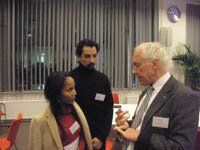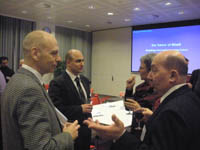Club of Amsterdam

Supporter
Shell Technology Centre Amsterdam
Videos
Credits: Andreas van Engelen, Sound Design, Video
Bill Spence, Manager Strategic Issues, Shell Upstream International
Andrei Kotov, Commercial Adviser Global LNG, Shell Upstream International
Guus Berkhout, Professor of Geosciences, Professor of Innovation
Presentations
Bill Spence, Manager Strategic Issues, Shell Upstream International
![]() Energy Scenarios & the future of Shell
Energy Scenarios & the future of Shell
Andrei Kotov, Commercial Adviser Global LNG, Shell Upstream International
![]() the future of Gas
the future of Gas
Guus Berkhout, Professor of Geosciences, Professor of Innovation
![]() New Business Framework for the Energy Industry
New Business Framework for the Energy Industry
Building a low-carbon energy future
from the Shell Sustainability Report 2009
The world is starting a shift towards a new, low-carbon energy future. But it will take several decades to get there. Shell is taking steps today to help build the energy system of tomorrow: producing more cleaner burning natural gas; working to deliver advanced fuels and lubricants and lower-carbon biofuels; and building a capability in carbon capture and storage.
As many countries emerge from recession and Asia’s economic growth continues, long-term global demand for energy is rising. By 2050 the world is expected to have over 2 billion more people and energy demand is likely to be twice as high as it is today. At the same time, greenhouse gas emissions must fall by at least half if the planet is to avoid the impact of significant climate change.
Mapping a route to a more sustainable energy future is a challenge for governments, business and consumers alike. It is also a technology opportunity: in the future our economies will be powered by a more diverse mix of fuels and energy sources than ever before. Natural gas – abundant and affordable – will play an increasingly vital role as the world moves towards a low-carbon future. It can act as a bridge to that future and be central to the long-term, lower-carbon energy mix. By 2050 biofuels, wind, solar and other renewables could provide 30% of the world’s energy, according to Shell’s energy scenarios. Oil will remain an important energy source for many decades, as will coal. But we expect industry, cars and domestic appliances to be more energy efficient than they are today.
Transforming the world’s energy system will not be easy. The challenges are “urgent and daunting”, according to the International Energy Agency.
Replacing coal with natural gas in electricity generation where possible – for example, as old coal plants are decommissioned – would cut CO2 emissions significantly in the power sector. A new gas-fired plant produces up to 70% less CO2 than an ageing coal plant and around half the CO2 of a modern coal plant for the same amount of power generated. Gas is more energy efficient than coal and produces electricity at less cost than any other fuel. Adding carbon capture and storage (CCS) technology to a gas-fired power station would further drastically reduce the plant’s CO2 emissions. For those power stations where coal continues to be used, CCS could be installed to reduce emissions. In both cases a price for CO2 needs to exist to make such investments viable.
Regulations will be needed to ensure energy savings by industry are not lost through greater energy use elsewhere. There will also need to be a revolution in consumer behaviour, with people using less power at home and at work.
More sustainable transport can play a crucial part in reducing CO2 emissions, with more advanced petrol and diesel engines powering smaller and lighter vehicles. More advanced fuels and lubricants will help. Biofuels for transport will continue to grow, while electric and hybrid cars are expected to become increasingly common.
Renewable energy will grow rapidly but it will take many years to meet large-scale demand. Traditionally it has taken around 30 years for a new energy source to capture 1% of the global market. Biofuels are there now. Wind power could reach the 1% mark at some point in the coming decade.
The speakers and topics are:
![]() Andrei Kotov, Commercial Adviser Global LNG, Shell Upstream International
Andrei Kotov, Commercial Adviser Global LNG, Shell Upstream International
the future of Gas
![]() Guus Berkhout, Professor of Geosciences, Professor of Innovation
Guus Berkhout, Professor of Geosciences, Professor of Innovation
New Business Framework for the Energy Industry
Using new scientific insights, I will reveal that the future energy needs of mankind will be significantly higher than published by the established energy institutes. This means that the fossil (‘ancient biomass’) industry and the new (‘renewable’) energy players must work towards a common goal: guaranteed supply of clean energy at affordable prices.
But it is not only the exploding energy needs that will drive the transition of the energy sector. Looking at the fundamental changes occurring in society today, corporations cannot afford to carry on with their business as usual. The purpose of economic growth must be redefined, causing a major transformation in business thinking. I will explain that markets of the future will be steered by societal needs, meaning that social and environmental externalities are essential components of future business models.
![]() Bill Spence, Manager Strategic Issues, Shell Upstream International
Bill Spence, Manager Strategic Issues, Shell Upstream International
Energy Scenarios & the future of Shell
Scenarios describing the future of the world and its energy systems. The
role of oil and gas companies, specifically Shell. What does the future
hold?
19:00 – 20:00
Introduction by our Moderator
![]() Adriaan Kamp, Owner, Kamp Beheer
Adriaan Kamp, Owner, Kamp Beheer
Part I:
![]() Andrei Kotov, Commercial Adviser Global LNG, Shell Upstream International
Andrei Kotov, Commercial Adviser Global LNG, Shell Upstream International
the future of Gas
![]() Guus Berkhout, Professor of Geosciences, Professor of Innovation
Guus Berkhout, Professor of Geosciences, Professor of Innovation
New Business Framework for the Energy Industry
![]() Bill Spence, Manager Strategic Issues, Shell Upstream International
Bill Spence, Manager Strategic Issues, Shell Upstream International
Energy Scenarios & the future of Shell
20:00 – 20:30
Break with buffet & drinks.
20:30 – 21:15
Part II:
Open discussion

Andrei Kotov
Commercial Adviser Global LNG, Shell Upstream International
Andrei Kotov is the Commercial Advisor with Shell’s Global LNG Business, prior to which he was a Business Development Advisor CO2 Shell’s Carbon Capture and Storage Team.
Andrei holds a Master’s of Science in Economics degree from the University of St. Gallen (Switzerland, with an exchange semester at the University of Chicago’s Booth School of Business) and an MBA. He subsequently joined Shell Global Solutions International as a Contracts Advisor. Andrei’s career, both prior to joining Shell and within the Shell Group, has comprised a variety of postings ranging from mainly operational to purely commercial across energy industry’s entire value chain. In addition to his experience in the business domain, Andrei is a regular contributor to major business dailies, including Financial Times and International Herald Tribune (the international edition of the New York Times) with commentary topics addressing a broad array of issues of global concern.
www.shell.com

Guus Berkhout
Professor of Geosciences, Professor of Innovation
Professor Guus Berkhout started his career with Shell in 1964, where he held several international positions in R&D and technology transfer. In 1976 he accepted a Chair at Delft University of Technology in the field of geophysical and acoustical imaging. In 2001 he also was appointed in the field of innovation management. Today, his research is financed by a consortium of 35 international companies.
Professor Berkhout is member of the Royal Netherlands Academy of Arts and Sciences (KNAW) and of the Netherlands Academy of Engineers (AcTI).
www.aj-birchwood.com

Bill Spence
Manager Strategic Issues, Shell Upstream International
Bill Spence is the Manager of Strategic Issues for Shell’s Upstream International Business. In the 5 years preceding this position Bill was the Vice President CO2 in the Shell’s corporate head office.
Bill graduated from Queen’s University (Canada) in 1984 with an Engineering Physics degree. He subsequently joined Shell Canada as a Petroleum Engineer. In 1989 he joined Shell International where he has lived and worked in numerous countries. His career has spanned both technical and commercial roles in the Upstream, Gas & Power and Renewables.
www.shell.com

Adriaan Kamp
Owner, Kamp Beheer
Worked 20 years in international project and business development management positions (5 countries) in the Upstream Oil and Gas sector (Shell Group International) and as private entrepreneur. Adriaan’s track record includes the leadership over the successful execution and delivery of major industrial (engineering and energy) projects . He is an accredited Project Manager for large and complex engineering projects.
Adriaan ‘s background combines Entrepreneuring, Business Development and Innovation with Excellence in Execution (Strategy, Execution, People).
Adriaan is presently a member of the Delphi Foundation (international think-tank on Energy matters), a speaker on Cleantech and Energy matters, and has been accredited as a Servant Leader (by Greenleaf Servant Leadership).
Adriaan was born in 1961. Studied Applied Physics (M.Sc.) at the University of Delft. He lives in Overveen, has 2 sons, and hobbies include travelling, sports, spirituality/ religion, business literature and a good conversation with family and friends.
             |






Customer Reviews
Thanks for submitting your comment!